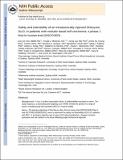Safety and tolerability of an intratumorally injected DNAzyme, Dz13, in patients with nodular basal-cell carcinoma: a phase 1 first-in-human trial (DISCOVER)
Author(s)
Cho, Eun-Ae; Au-Yeung, Annie; China, Carlos; Yosufi, Benafsha; Arkenau, Hendrik-Tobias; Moloney, Fergal J.; Scolyer, Richard A.; Raftery, Mark J.; Deng, Jason Z.; Morton, Stephen Winford; Damian, Diona L.; Francis, Douglas J.; Chesterman, Colin N.; Barnetson, Ross St. C.; Halliday, Gary M.; Khachigian, Levon M.; Cai, Hong, Ph. D. Massachusetts Institute of Technology; Hammond, Paula T; ... Show more Show less
DownloadHammond_Safety and.pdf (2.614Mb)
PUBLISHER_CC
Publisher with Creative Commons License
Creative Commons Attribution
Terms of use
Metadata
Show full item recordAbstract
Background
The nuclear transcription factor c-Jun is preferentially expressed in basal-cell carcinoma. Dz13 is a deoxyribozyme that targets JUN messenger RNA and has inhibited the growth of a range of tumours in mice. We did a phase 1 study to assess safety and tolerability in human beings.
Methods
Adults with nodular basal-cell carcinoma were recruited from Royal Prince Alfred Hospital, Sydney, Australia, between September, 2010, and October, 2011. Patients were assigned to receive one intratumoral injected dose of 10, 30, or 100 μg Dz13, in a 50 μL volume of lipid carrier, and were assessed for adverse effects in the first 24 h then at 7, 14, and 28 days after injection. Treated tumours were surgically excised 14 days after injection and compared with the baseline biopsy samples for expression of c-Jun and tumorigenesis markers.
Findings
Nine patients were recruited, of whom three received each dose of Dz13. All patients completed the study with no drug-related serious adverse events. No systemic Dz13 exposure was detected. c-Jun expression was reduced in the excised tumours of all nine (100%) patients, compared with baseline, and histological tumour depth had decreased in five (56%) of nine. Proportions of cells positive for caspases 3, 8, and 9 and P53 were increased, but those of cells positive for Bcl-2 and MMP-9 were decreased. Infiltration by inflammatory and immune cells was stimulated.
Interpretation
Dz13 was safe and well tolerated after single intratumoral injections at all doses.
Date issued
2013-05Department
Massachusetts Institute of Technology. Department of Chemical Engineering; Koch Institute for Integrative Cancer Research at MITJournal
The Lancet
Publisher
Elsevier
Citation
Cho, Eun-Ae, Fergal J Moloney, Hong Cai, Annie Au-Yeung, Carlos China, Richard A Scolyer, Benafsha Yosufi, et al. “Safety and Tolerability of an Intratumorally Injected DNAzyme, Dz13, in Patients with Nodular Basal-Cell Carcinoma: A Phase 1 First-in-Human Trial (DISCOVER).” The Lancet 381, no. 9880 (May 2013): 1835–43.
Version: Author's final manuscript
ISSN
01406736
1474-547X